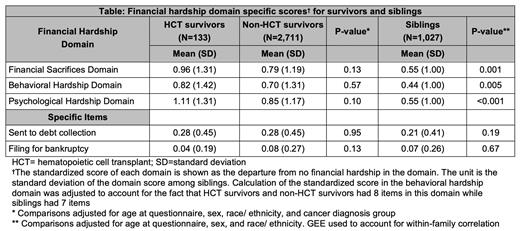Abstract
Background: Whether treatment with hematopoietic cell transplant (HCT) increases risk for financial hardship in long-term survivors of childhood cancer is not well established. To address this knowledge gap, we utilized the Childhood Cancer Survivor Study (CCSS) to examine financial outcomes among adult survivors of childhood cancer (diagnosed <21 years of age between 1970-99) who had undergone HCT and compared them to conventionally treated (non-HCT) survivors and sibling controls.
Methods: Financial hardship outcomes were collected from a survey during 2017-19, including three domains: material hardship or financial sacrifices (8 items), behavioral hardship (8 items), and psychological hardship (3 items), and two additional items, a history of being sent to debt collection and filing for bankruptcy. Determinants of hardship including work-related changes, health insurance costs and concerns regarding maintaining coverage, assets, and debts were also assessed. The standardized score of each domain of financial hardship was calculated and depicted as the departure in the unit of sibling's standard deviation from no financial hardship in the specified domain, with higher scores indicating higher financial hardship. Scores were compared between HCT survivors and siblings (adjusted for age, sex, and race/ethnicity) using generalized estimating equations to adjust for potential intra-family correlation. We also performed adjusted comparisons of scores between HCT and non-HCT survivors (adjusted for age, sex, race/ethnicity, and diagnosis). Similarly, adjusted comparisons of proportion of survivors reporting individual items within each hardship domain were also made. Additionally, multivariable regression models including HCT status (HCT vs. non-HCT), survivors’ socio-demographic factors, treatment exposures, and complications after completion of therapy evaluated factors associated with domains of financial hardship among survivors. Differences in the standardized financial hardship scores between HCT and non-HCT survivors and their 95% confidence intervals (CI) were reported.
Results: There were 133 HCT survivors (median age at survey 35 [range 20-61] years), 2,711 non-HCT survivors (median age at survey 39 [19-67] years), and 1,027 sibling controls (median age at survey 46 [21-69] years) evaluated. HCT and non-HCT survivors were an average of 26 (range 18-43) and 31 (range 18-49) years from completion of therapy, respectively. HCT survivors reported significantly more financial hardship compared to sibling controls across all domains (P<0.05, Table). In contrast, while the mean standardized scores of HCT survivors were higher compared to non-HCT survivors, the differences were not statistically significant for any of the domains. When comparing individual items within each hardship domain, a higher proportion of HCT survivors compared to non-HCT survivors reported delayed or reduced spending on home improvement (24% vs 18%, P=0.03) and reduced spending on basics (21% vs 14%, P=0.04) within the material hardship or financial sacrifices domain. Similarly, in the behavioral hardship domain, a higher proportion of HCT survivors reported foregoing eyeglasses (20 vs 12%, P=0.02). In the psychological hardship domain, a higher proportion of HCT survivors reported worry or stress about having enough money to pay for utilities (38% vs 28%, P=0.03). Additionally, a higher percentage of HCT survivors reported that their spouse stayed in a job to avoid losing health insurance (26% vs 16%, P=0.04) and a lower percentage of HCT survivors reported owning a home (23% vs 42%, P=0.008). In multivariable analysis for each domain of financial hardship, compared to HCT survivors, the average differences (95% CI) in the standardized scores for the non-HCT survivors were not significantly different [Material: -0.08 (-0.37, 0.21); Behavioral: 0.17 (-0.11, 0.45); Psychological: -0.09 (-0.34, 0.17)].
Conclusions: Adult survivors of childhood cancer treated with HCT report greater overall financial hardship compared with sibling controls. An increased risk for HCT over non-HCT therapy was not observed when considering standardized scores adjusted for covariates, though differences between the groups for individual items in the specific domains deserve consideration. These findings call for strategies for the mitigation of financial hardship in this population.
Disclosures
Bhatt:Pfizer Inc.: Divested equity in a private or publicly-traded company in the past 24 months; Moderna Inc.: Divested equity in a private or publicly-traded company in the past 24 months; Johnson & Johnson: Divested equity in a private or publicly-traded company in the past 24 months; Rite Aid Corp.: Divested equity in a private or publicly-traded company in the past 24 months. Chow:Abbott Laboratories: Research Funding. Yabroff:Flatiron health: Membership on an entity's Board of Directors or advisory committees; American Cancer Society: Honoraria. Khera:Optum: Honoraria; Incyte: Consultancy.
Author notes
Asterisk with author names denotes non-ASH members.


